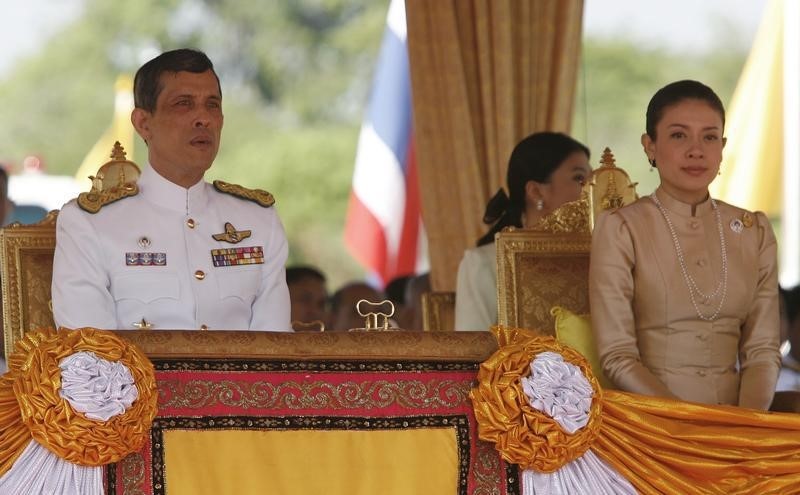By Amy Sawitta Lefevre
BANGKOK (Reuters) - Two Thai army officers and a civilian have answered a police summons, police said, in a widening corruption investigation that has also led to the arrest of high-ranking policemen and relatives of Princess Srirasmi, the wife of the Crown Prince.
The investigation comes at a time of heightened sensitivity surrounding the palace months after the military launched a coup. The revered but ailing King Bhumibol Adulyadej, 86, was admitted to hospital in October and underwent an operation to remove his gallbladder.
Last week, some senior police officers and civilians were arrested in the crackdown into alleged police graft including charges ranging from bribery to defaming the monarchy.
Among them were three people with the Akrapongpreecha surname, the royal name bestowed on Srirasmi's family when she married Crown Prince Vajiralongkorn in 2001, police said.
Witthaya Theskhunthot, a civilian, and army officers Sergeant Nathakorn Yasri and Sergeant Thiraphong Chochampi, were the latest suspects to surrender to authorities.
"Altogether three people turned themselves in," Major-General Chanthep Saesawet, deputy commissioner of the Metropolitan Police Bureau, told Reuters.
"The two army officers are being detained by the army and one civilian surrendered to police on Monday night at a television broadcasting station."
The men turned themselves in three days after Crown Prince Vajiralongkorn asked the government to strip his wife Srirasmi's family of the royal name.
Police say Lieutenant General Pongpat Chayapan, a former head of the Central Investigation Bureau, was the ringleader. Pongpat and several others were charged under harsh lese-majeste laws for allegedly citing the monarchy for personal benefit.
The suspects have not been allowed to comment publicly on the charges, which include money-laundering and oil smuggling.
Police last week displayed slides showing antique Buddhist statues, gold bars, stacks of cash and cars seized at safehouses allegedly linked to some of the suspects.
There is mounting concern over the health of King Bhumibol who is seen by many as the father of the nation - a unifying figure who has intervened in times of political crisis.
The king remained silent during the latest crisis which began last year when the government of former Prime Minister Yingluck Shinawatra tried to push through an amnesty that would have pardoned her brother, exiled former premier Thaksin Shinawatra.
Thaksin, a populist former telecommunications tycoon, was ousted in a 2006 putsch and faces a two-year jail term for graft.
Thailand has been divided for a decade between Thaksin and the Bangkok-based royalist-military establishment, which sees him as a threat.
Thaksin's critics accused him of republican leanings, which he denies. He has strong support among poor rural and urban voters.
Thailand remains under martial law following a May 22 coup which followed months of demonstrations against Yingluck's government by largely middle-class supporters of the establishment.
Prime Minister Prayuth Chan-ocha, the former army chief who led the coup, is a staunch royalist who has vowed to root out critics of the monarchy.
The designated heir to the throne is Vajiralongkorn, a fighter pilot who has in recent years assumed many of his father's ceremonial duties. Srirasmi is his third wife and the mother of Prince Dipangkorn Rasmijoti, the presumed heir to the throne after his father.

Thailand's laws protecting senior members of the monarchy from insult are among the strictest in the world. Article 112 of the criminal code makes it a crime to defame, insult or threaten the king, queen, heir-apparent or the regent.
(Additional reporting by Bangkok Bureau; Editing by Andrew R.C. Marshall, Simon Webb and Nick Macfie)